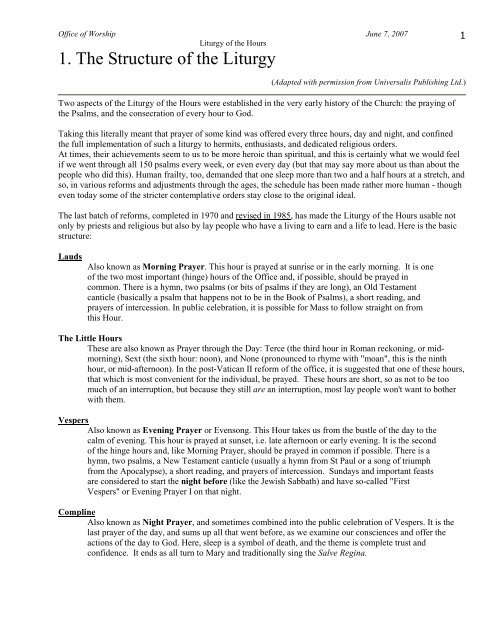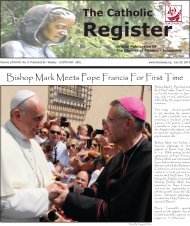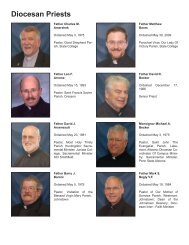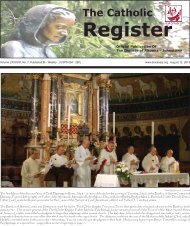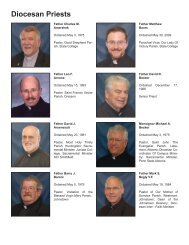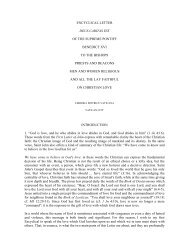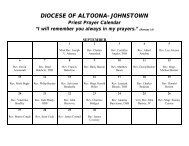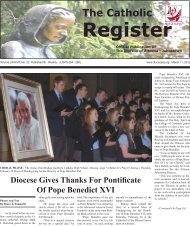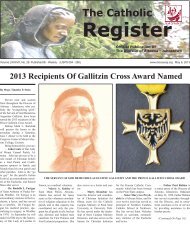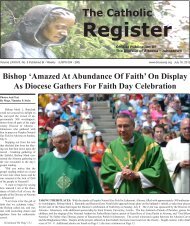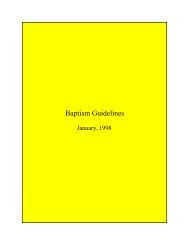Liturgy of the Hours, includes both Structure and Outline
Liturgy of the Hours, includes both Structure and Outline
Liturgy of the Hours, includes both Structure and Outline
You also want an ePaper? Increase the reach of your titles
YUMPU automatically turns print PDFs into web optimized ePapers that Google loves.
Office <strong>of</strong> Worship June 7, 2007<br />
<strong>Liturgy</strong> <strong>of</strong> <strong>the</strong> <strong>Hours</strong><br />
1. The <strong>Structure</strong> <strong>of</strong> <strong>the</strong> <strong>Liturgy</strong><br />
1<br />
(Adapted with permission from Universalis Publishing Ltd.)<br />
Two aspects <strong>of</strong> <strong>the</strong> <strong>Liturgy</strong> <strong>of</strong> <strong>the</strong> <strong>Hours</strong> were established in <strong>the</strong> very early history <strong>of</strong> <strong>the</strong> Church: <strong>the</strong> praying <strong>of</strong><br />
<strong>the</strong> Psalms, <strong>and</strong> <strong>the</strong> consecration <strong>of</strong> every hour to God.<br />
Taking this literally meant that prayer <strong>of</strong> some kind was <strong>of</strong>fered every three hours, day <strong>and</strong> night, <strong>and</strong> confined<br />
<strong>the</strong> full implementation <strong>of</strong> such a liturgy to hermits, enthusiasts, <strong>and</strong> dedicated religious orders.<br />
At times, <strong>the</strong>ir achievements seem to us to be more heroic than spiritual, <strong>and</strong> this is certainly what we would feel<br />
if we went through all 150 psalms every week, or even every day (but that may say more about us than about <strong>the</strong><br />
people who did this). Human frailty, too, dem<strong>and</strong>ed that one sleep more than two <strong>and</strong> a half hours at a stretch, <strong>and</strong><br />
so, in various reforms <strong>and</strong> adjustments through <strong>the</strong> ages, <strong>the</strong> schedule has been made ra<strong>the</strong>r more human - though<br />
even today some <strong>of</strong> <strong>the</strong> stricter contemplative orders stay close to <strong>the</strong> original ideal.<br />
The last batch <strong>of</strong> reforms, completed in 1970 <strong>and</strong> revised in 1985, has made <strong>the</strong> <strong>Liturgy</strong> <strong>of</strong> <strong>the</strong> <strong>Hours</strong> usable not<br />
only by priests <strong>and</strong> religious but also by lay people who have a living to earn <strong>and</strong> a life to lead. Here is <strong>the</strong> basic<br />
structure:<br />
Lauds<br />
Also known as Morning Prayer. This hour is prayed at sunrise or in <strong>the</strong> early morning. It is one<br />
<strong>of</strong> <strong>the</strong> two most important (hinge) hours <strong>of</strong> <strong>the</strong> Office <strong>and</strong>, if possible, should be prayed in<br />
common. There is a hymn, two psalms (or bits <strong>of</strong> psalms if <strong>the</strong>y are long), an Old Testament<br />
canticle (basically a psalm that happens not to be in <strong>the</strong> Book <strong>of</strong> Psalms), a short reading, <strong>and</strong><br />
prayers <strong>of</strong> intercession. In public celebration, it is possible for Mass to follow straight on from<br />
this Hour.<br />
The Little <strong>Hours</strong><br />
These are also known as Prayer through <strong>the</strong> Day: Terce (<strong>the</strong> third hour in Roman reckoning, or midmorning),<br />
Sext (<strong>the</strong> sixth hour: noon), <strong>and</strong> None (pronounced to rhyme with "moan", this is <strong>the</strong> ninth<br />
hour, or mid-afternoon). In <strong>the</strong> post-Vatican II reform <strong>of</strong> <strong>the</strong> <strong>of</strong>fice, it is suggested that one <strong>of</strong> <strong>the</strong>se hours,<br />
that which is most convenient for <strong>the</strong> individual, be prayed. These hours are short, so as not to be too<br />
much <strong>of</strong> an interruption, but because <strong>the</strong>y still are an interruption, most lay people won't want to bo<strong>the</strong>r<br />
with <strong>the</strong>m.<br />
Vespers<br />
Also known as Evening Prayer or Evensong. This Hour takes us from <strong>the</strong> bustle <strong>of</strong> <strong>the</strong> day to <strong>the</strong><br />
calm <strong>of</strong> evening. This hour is prayed at sunset, i.e. late afternoon or early evening. It is <strong>the</strong> second<br />
<strong>of</strong> <strong>the</strong> hinge hours <strong>and</strong>, like Morning Prayer, should be prayed in common if possible. There is a<br />
hymn, two psalms, a New Testament canticle (usually a hymn from St Paul or a song <strong>of</strong> triumph<br />
from <strong>the</strong> Apocalypse), a short reading, <strong>and</strong> prayers <strong>of</strong> intercession. Sundays <strong>and</strong> important feasts<br />
are considered to start <strong>the</strong> night before (like <strong>the</strong> Jewish Sabbath) <strong>and</strong> have so-called "First<br />
Vespers" or Evening Prayer I on that night.<br />
Compline<br />
Also known as Night Prayer, <strong>and</strong> sometimes combined into <strong>the</strong> public celebration <strong>of</strong> Vespers. It is <strong>the</strong><br />
last prayer <strong>of</strong> <strong>the</strong> day, <strong>and</strong> sums up all that went before, as we examine our consciences <strong>and</strong> <strong>of</strong>fer <strong>the</strong><br />
actions <strong>of</strong> <strong>the</strong> day to God. Here, sleep is a symbol <strong>of</strong> death, <strong>and</strong> <strong>the</strong> <strong>the</strong>me is complete trust <strong>and</strong><br />
confidence. It ends as all turn to Mary <strong>and</strong> traditionally sing <strong>the</strong> Salve Regina.
Office <strong>of</strong> Worship June 7, 2007<br />
<strong>Liturgy</strong> <strong>of</strong> <strong>the</strong> <strong>Hours</strong><br />
The Office <strong>of</strong> Readings<br />
This is a splendid innovation <strong>of</strong> <strong>the</strong> latest reforms. Unlike <strong>the</strong> o<strong>the</strong>r <strong>Hours</strong>, it can be said at any time <strong>of</strong><br />
day at all, whenever time <strong>and</strong> energy <strong>and</strong> circumstances allow you to pray <strong>and</strong> meditate. Moreover, it<br />
contains more substantial material for meditation, in <strong>the</strong> form <strong>of</strong> a solid Bible reading <strong>of</strong> a chapter or so<br />
(we only give you <strong>the</strong> references so that you can use your favourite translation, <strong>and</strong> we also have a link,<br />
where possible, to an online version). Then comes <strong>the</strong> glory <strong>of</strong> <strong>the</strong> whole <strong>Liturgy</strong> - a second reading,<br />
which is not biblical but is taken from <strong>the</strong> earliest centuries <strong>of</strong> <strong>the</strong> Church, or from old homilies whose<br />
very authors have been forgotten, or from <strong>the</strong> writings or biographies <strong>of</strong> <strong>the</strong> saints. It is an immense task<br />
to fill this site with second readings, <strong>and</strong> will take a year or more... so please be patient.<br />
The Invitatory Psalm<br />
The Invitatory Psalm acts as a kind <strong>of</strong> introduction to <strong>the</strong> entire Divine Office for <strong>the</strong> day. When you say<br />
it <strong>the</strong>refore depends on which hour you recite first. If you start with Lauds, say it at <strong>the</strong> beginning <strong>of</strong><br />
Lauds; if you start with <strong>the</strong> Office <strong>of</strong> Readings (which, you will recall, can be recited at any time <strong>of</strong> <strong>the</strong><br />
day), <strong>the</strong>n say <strong>the</strong> invitatory psalm at <strong>the</strong> beginning <strong>of</strong> <strong>the</strong> Office <strong>of</strong> Readings. If all that you recite in <strong>the</strong><br />
day is Vespers, <strong>the</strong>n say <strong>the</strong> invitatory psalm at <strong>the</strong> beginning <strong>of</strong> Vespers. This site lets you view versions<br />
<strong>of</strong> Lauds <strong>and</strong> <strong>the</strong> Office <strong>of</strong> Readings <strong>both</strong> with <strong>and</strong> without <strong>the</strong> invitatory psalm.<br />
What has happened to Matins?<br />
Matins was originally <strong>the</strong> <strong>of</strong>fice <strong>of</strong> Vigils, prayer <strong>of</strong>fered in <strong>the</strong> middle <strong>of</strong> <strong>the</strong> night, but underst<strong>and</strong>able<br />
human weakness moved it to <strong>the</strong> early morning; never<strong>the</strong>less, it retained its character <strong>of</strong> a night prayer,<br />
even being subdivided into between one <strong>and</strong> three parts called "nocturns". This <strong>of</strong>fice was <strong>the</strong> longest one<br />
<strong>of</strong> <strong>the</strong> day, containing between nine <strong>and</strong> eighteen psalms, plus readings from <strong>the</strong> Old <strong>and</strong> New Testaments<br />
<strong>and</strong> from <strong>the</strong> Fa<strong>the</strong>rs. While such an <strong>of</strong>fice is reasonably suited to religious orders, who can order <strong>the</strong>ir<br />
day round <strong>the</strong>ir prayer, it is less well adapted to people who are living in <strong>the</strong> world, for whom first thing<br />
in <strong>the</strong> morning may not necessarily be <strong>the</strong> best time to study <strong>and</strong> meditate in depth. Accordingly, <strong>the</strong> latest<br />
reforms have transformed Matins into <strong>the</strong> Office <strong>of</strong> Readings <strong>and</strong> removed its specifically nocturnal<br />
character. It has, instead, <strong>the</strong> most meditative psalms <strong>and</strong> those that narrate <strong>the</strong> course <strong>of</strong> salvation history;<br />
<strong>and</strong> it can be said at any hour <strong>of</strong> <strong>the</strong> day or night.<br />
What has happened to Prime?<br />
It has been abolished. It was, in any case, a relatively recent innovation, being introduced after <strong>the</strong> o<strong>the</strong>r<br />
hours had already been established. The manner <strong>of</strong> its introduction was this: around <strong>the</strong> year 382, in one<br />
<strong>of</strong> <strong>the</strong> monasteries near Bethlehem, a problem arose, because after <strong>the</strong> night <strong>of</strong>fices (which corresponded<br />
to <strong>the</strong> more modern Matins <strong>and</strong> Lauds), <strong>the</strong> monks could retire to rest. The lazier ones <strong>the</strong>n stayed in bed<br />
until nine in <strong>the</strong> morning (<strong>the</strong> hour <strong>of</strong> Terce) instead <strong>of</strong> getting up to do <strong>the</strong>ir manual work or spiritual<br />
reading. The short <strong>of</strong>fice <strong>of</strong> Prime, inserted a couple <strong>of</strong> hours before Terce, solved <strong>the</strong> problem, by calling<br />
<strong>the</strong>m toge<strong>the</strong>r to pray <strong>and</strong> sending <strong>the</strong>m out to <strong>the</strong>ir tasks.<br />
2
Office <strong>of</strong> Worship June 7, 2007<br />
<strong>Liturgy</strong> <strong>of</strong> <strong>the</strong> <strong>Hours</strong><br />
2. How to Recite <strong>the</strong> <strong>Hours</strong><br />
3<br />
There are nine-<strong>and</strong>-sixty ways <strong>of</strong> constructing tribal laws,<br />
And every single one <strong>of</strong> <strong>the</strong>m is right!<br />
RUDYARD KIPLING<br />
This is an informal summary <strong>of</strong> <strong>the</strong> General Instruction on <strong>the</strong> <strong>Liturgy</strong> <strong>of</strong> <strong>the</strong> <strong>Hours</strong>. The full text can be found<br />
in most breviaries (at <strong>the</strong> start <strong>of</strong> Vol. 1 <strong>of</strong> multi-volume sets).<br />
In contrast with <strong>the</strong> Mass, <strong>the</strong> <strong>Liturgy</strong> <strong>of</strong> <strong>the</strong> <strong>Hours</strong> is relatively free in its specification <strong>of</strong> how things should be<br />
done. The texts, psalms, <strong>and</strong> prayers are <strong>the</strong> important things, <strong>and</strong> after that, many variations are allowed<br />
according to local circumstances <strong>and</strong> tradition.<br />
Bodily posture<br />
The General Instruction concerns itself with public celebration <strong>of</strong> <strong>the</strong> Divine Office. In private recitation you<br />
should adopt whatever posture seems reasonable <strong>and</strong> appropriate. Similarly, in recitation within a small group<br />
(such as a family) <strong>the</strong> aim is to assist <strong>the</strong> devotional aspect <strong>of</strong> <strong>the</strong> Office <strong>and</strong> not to cause a distraction--<br />
frequently, an unvarying posture (st<strong>and</strong>ing or sitting) is best. For your information, however, here is a brief<br />
summary <strong>of</strong> what happens in a public celebration:<br />
• All st<strong>and</strong> during <strong>the</strong> introduction to <strong>the</strong> Office <strong>and</strong> during <strong>the</strong> opening hymn (if <strong>the</strong>re is one)..<br />
• All sit during <strong>the</strong> readings (except Gospel readings).<br />
• All st<strong>and</strong> during <strong>the</strong> Magnificat, Benedictus, or Nunc Dimittis, <strong>and</strong> during <strong>the</strong> concluding prayers.<br />
• During <strong>the</strong> psalms, people may sit or st<strong>and</strong>, according to local custom.<br />
• All cross <strong>the</strong>mselves at <strong>the</strong> start <strong>of</strong> each Hour <strong>and</strong> at <strong>the</strong> start <strong>of</strong> <strong>the</strong> canticle: Magnificat, Benedictus, or<br />
Nunc Dimittis.<br />
• All make a pr<strong>of</strong>ound bow at <strong>the</strong> invocation <strong>of</strong> <strong>the</strong> Trinity in <strong>the</strong> Doxology (Glory Be).<br />
• Kneeling is not recommended.<br />
Reciting <strong>the</strong> psalms<br />
Each psalm in <strong>the</strong> Divine Office has a title, which is not intended to be read out loud, but which helps in <strong>the</strong><br />
underst<strong>and</strong>ing <strong>of</strong> its significance. This title comes from <strong>the</strong> Old Testament. These is also a Caption, which comes<br />
from <strong>the</strong> New Testament or from <strong>the</strong> Patristics. Each psalm is also given an antiphon. The antiphon may be said<br />
once, at <strong>the</strong> beginning <strong>of</strong> <strong>the</strong> psalm; or once at <strong>the</strong> beginning <strong>and</strong> once at <strong>the</strong> end (ei<strong>the</strong>r before or after <strong>the</strong> Glory<br />
Be); or additionally between every verse <strong>of</strong> <strong>the</strong> psalm. Which <strong>of</strong> <strong>the</strong>se methods is chosen is up to whoever is<br />
organizing <strong>the</strong> recitation: if you are doing it on your own, <strong>the</strong>n you have to choose for yourself.<br />
In a celebration <strong>of</strong> <strong>the</strong> <strong>Hours</strong> by more than one person, it is also possible to alternate <strong>the</strong> verses, between two<br />
choirs or two parts <strong>of</strong> <strong>the</strong> congregation. In this case it is probably less appropriate to insert <strong>the</strong> antiphon after<br />
every verse.<br />
When a longer psalm has been split into parts, each part can be treated as a separate psalm, or <strong>the</strong> parts can be<br />
united into a single, longer psalm, with <strong>the</strong> Glory Be said only once, at <strong>the</strong> very end.<br />
Pacing<br />
The recitation should be deliberate <strong>and</strong> unhurried, to hear God speaking in <strong>the</strong> spaces <strong>of</strong> silence.<br />
Readings<br />
Lauds <strong>and</strong> Vespers have short Biblical readings . It is always permissible to substitute appropriate longer<br />
readings for <strong>the</strong>se: for instance, <strong>the</strong> Mass reading <strong>of</strong> <strong>the</strong> day.
Office <strong>of</strong> Worship June 7, 2007<br />
<strong>Liturgy</strong> <strong>of</strong> <strong>the</strong> <strong>Hours</strong><br />
4<br />
Responsories<br />
Responsories (See Compline) follow readings in <strong>the</strong> <strong>Liturgy</strong>, <strong>and</strong> help to meditate on <strong>the</strong> significance <strong>of</strong> those<br />
readings. In individual recitation, <strong>the</strong> repeated part <strong>of</strong> <strong>the</strong> responsory can be omitted, unless <strong>the</strong> meaning dem<strong>and</strong>s<br />
that it be kept.<br />
Prayers <strong>and</strong> Intercessions<br />
These start with an introduction <strong>and</strong> a short response, <strong>and</strong> <strong>the</strong>re <strong>the</strong>n follow a number <strong>of</strong> intentions, each <strong>of</strong> which<br />
is in two halves. Here are <strong>the</strong> two methods recommended by <strong>the</strong> General Instruction:<br />
1. The priest or minister says <strong>the</strong> introduction <strong>and</strong> <strong>the</strong> people give <strong>the</strong> response. Then <strong>the</strong> priest says <strong>both</strong><br />
halves <strong>of</strong> each intention <strong>and</strong> <strong>the</strong> people repeat <strong>the</strong> response.<br />
2. The priest or minister says <strong>the</strong> introduction <strong>and</strong> <strong>the</strong> people give <strong>the</strong> response. Then <strong>the</strong> priest says <strong>the</strong> first<br />
half <strong>of</strong> each intention <strong>and</strong> <strong>the</strong> people say <strong>the</strong> second half (<strong>the</strong> response is not used again).<br />
When reciting <strong>the</strong> Office on your own, choose whatever is most comfortable. The second method usually works<br />
better. It is permissible to add special intentions at Morning Prayer <strong>and</strong> at Evening Prayer.<br />
The Office <strong>of</strong> Readings<br />
This may be said at any time - even after Vespers <strong>of</strong> <strong>the</strong> previous night. It helps, though, to try to say it at a<br />
regular time each day.<br />
Joining different Offices toge<strong>the</strong>r<br />
Where circumstances require it, <strong>the</strong> public celebration <strong>of</strong> a particular Hour may be merged with <strong>the</strong> Mass, or with<br />
ano<strong>the</strong>r Hour. The rules for doing this are ra<strong>the</strong>r complicated, <strong>and</strong> can be found in <strong>the</strong> General Instruction referred<br />
to at <strong>the</strong> start <strong>of</strong> this page. Not all scholars agree that <strong>the</strong>y should be combined, referring to <strong>the</strong> joining as “mauds<br />
<strong>and</strong> mespers.”<br />
Adapted from:<br />
Universalis Publishing Ltd.<br />
PO Box 23700<br />
London SW5 0WN<br />
Engl<strong>and</strong><br />
www.universalis.com<br />
With permission © Copyright 1996-2004 Universalis Publishing Ltd
Office <strong>of</strong> Worship June 7, 2007<br />
<strong>Liturgy</strong> <strong>of</strong> <strong>the</strong> <strong>Hours</strong><br />
3. <strong>Outline</strong> <strong>of</strong> <strong>the</strong> <strong>Liturgy</strong> <strong>of</strong> <strong>the</strong> <strong>Hours</strong><br />
Morning Prayer<br />
5<br />
Morning Prayer structure:<br />
(The structure for each prayer is similar, with some variations.*)<br />
(Be sure that all have worship aid)<br />
Entrance Procession<br />
May begin with all seated in place<br />
The beginning <strong>of</strong> <strong>the</strong> hour (all st<strong>and</strong>ing) Sign <strong>of</strong> <strong>the</strong> cross<br />
or Introduction to Daily Office –<br />
Invitatory Sign <strong>of</strong> <strong>the</strong> cross on lips<br />
Doxology (Glory Be…) Pr<strong>of</strong>ound bow at name <strong>of</strong> Trinity<br />
Invitatory psalm<br />
Hymn (all st<strong>and</strong>ing)- corresponds to time <strong>of</strong> day <strong>and</strong> season, crucial to setting <strong>the</strong> tone<br />
Psalms all sitting or st<strong>and</strong>ing<br />
(Below <strong>the</strong> psalm number, <strong>the</strong>re is a Title, <strong>of</strong> Old Testament origin put in Christic context, <strong>the</strong>n a Caption, from<br />
New Testament or Patristic source)<br />
Antiphon 1<br />
Psalm, 147 psalms used; 3 imprecatory (cursing) psalms omitted<br />
Doxology:<br />
Antiphon 1<br />
Psalm Prayer (optional)<br />
Silence It is <strong>the</strong> silence that God speaks!<br />
Antiphon 2,<br />
Canticle,<br />
Doxology<br />
Antiphon 2<br />
Psalm Prayer (optional)<br />
Silence<br />
Silence<br />
Antiphon 3,<br />
Psalm,<br />
Doxology<br />
Antiphon 3<br />
Psalm Prayer (optional).<br />
Scripture Reading all sit<br />
- Brief Homily may follow<br />
Silence<br />
May be leng<strong>the</strong>ned<br />
Short Responsory or psalm<br />
Gospel Canticle<br />
Gospel Canticle Antiphon (sitting) Incense may be prepared<br />
Canticle (all st<strong>and</strong>ing) Make sign <strong>of</strong> cross at beginning<br />
Antiphon repeated<br />
Intercessions – choice <strong>of</strong> through composed response; or invariable response with large ga<strong>the</strong>ring<br />
Our Fa<strong>the</strong>r<br />
Concluding Prayer<br />
Blessing <strong>and</strong> Dismissal<br />
Alternative form for lay presider<br />
*Evening Prayer may include additional elements: Lucerarium (lighting <strong>of</strong> c<strong>and</strong>les), incense rite at Psalm 141 <strong>and</strong><br />
Canticle <strong>of</strong> Mary (Magnificat).


